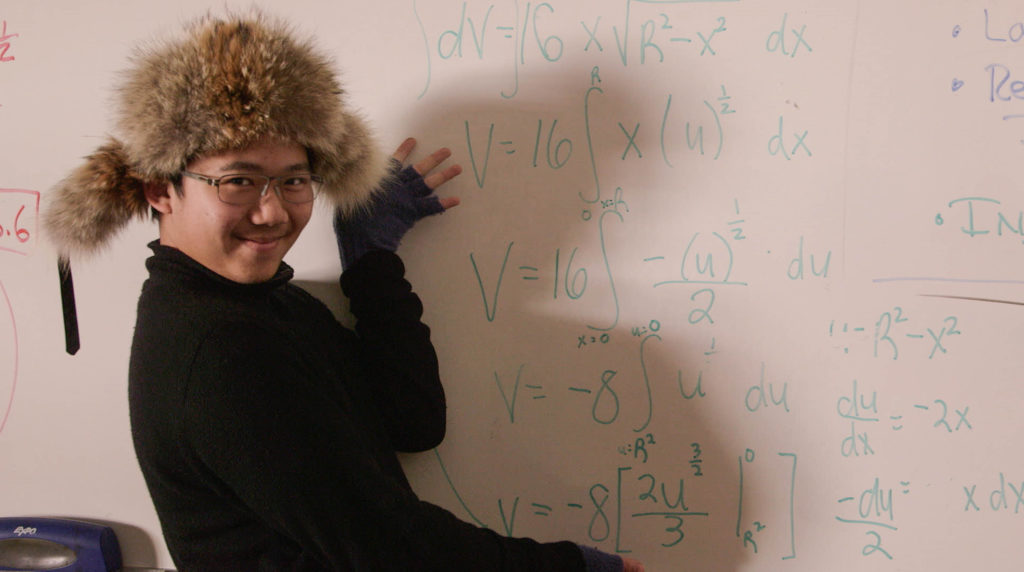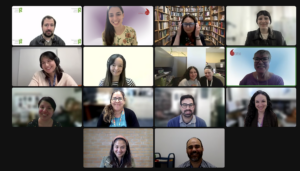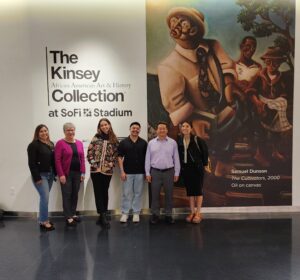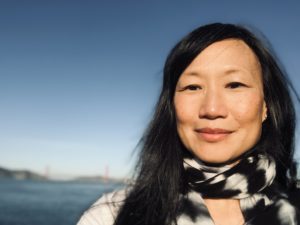
“Today’s wave of anti-Asian violence is a stark reminder of a history of anti-Asian sentiment in America and how Asian American Pacific Islanders have been rendered less than human through our invisibility. Without films and stories that capture our humanity, our community cannot survive.” – Debbie Lum, Try Harder! Director/Producer
With the start of a new school year, another California high school seniors’ class is set to embark on what can be a hyper-competitive and emotionally draining college application process. In her new film, Try Harder! Director Debbie Lum follows five seniors at San Francisco’s Lowell High School over the course of a year and, with humor and heart, takes us to the reality of the American college application process. Try Harder! premiered at the 2021 Sundance Film Festival and will be broadcast nationally on the PBS series Independent Lens in the spring of 2022.
Senior Program Officer John Lightfoot recently spoke with filmmaker and California Documentary Project grantee Debbie Lum about her film.
What were the origins of this project? What questions did you pursue as you developed Try Harder! and did those change along the way?
I became a mother before releasing my last documentary, Seeking Asian Female, which premiered at SXSW and broadcast on PBS’ Independent Lens. As I was enrolling my daughter into preschool in San Francisco, all around me, moms were stressing about how to set their toddlers on a path that would seal their brightest future – or one day lead to Harvard. Experiencing firsthand the frenzy over elite college admissions gripping our nation, I decided to investigate my own community’s obsession with academic excellence.
I began by exploring the social phenomenon of “tiger moms,” so-called immigrant Asian mothers who push their children to academic success at all costs. I spoke to principals and counselors across the Bay Area, who explained no matter how hard their students worked, college acceptance felt like a lottery. Their staff was on suicide watch as kids who excelled in class, sports, and any extracurricular one could think of could not achieve their high school dreams. Then I met the students of Lowell High School, the top-ranked, majority Asian American, public high school in San Francisco — aka “tiger mother central,” and found myself surrounded by loveable students, each with a story to tell, who far exceeded their reputation as competitive, test-taking machines. With the weight of the future hanging over them, I felt their palpable desire to have their stories told. So, our team pivoted to tell the students’ story at this iconic Asian American high school that had never been captured in a feature-length film before. I aimed to take audiences through today’s college admissions journey and hold up a mirror for us to reflect on the impact of this brutal process on America’s youth. I also hoped to capture a teenage POV experiencing this pivotal moment, for, in all the headline-grabbing stories about cheating scandals and alleged discrimination in top colleges, the student’s voice at the center is just barely heard.
Alongside kids living in poverty, foster care, or with incarcerated parents, high-achieving teens were named “at-risk” youth because of exorbitant levels of mental health issues, only exacerbated by the pandemic. For AAPI students, the need to shine a light on this story is particularly acute. Young Asian Americans have long endured soul-crushing labels like “the model minority.” They’re stereotyped as “smarter” than other students and ultimately dehumanized as “the competition.” I’ve spent my career making films about the Asian American experience. In over two decades of creating AAPI films, I’ve had to continuously justify what makes an AAPI character relatable when it’s the storytelling and the narrative that are universal. I love to drill deep into stereotypes about our community to excavate the nuances, humor, and hidden truths that make us richly complex. Today’s wave of anti-Asian violence is a stark reminder of a history of anti-Asian sentiment in America and how Asian American Pacific Islanders have been rendered less than human through our invisibility. Without films and stories that capture our humanity, our community cannot survive.
Try Harder! focuses on the experiences of a handful of students as they navigate their senior years. Without giving too much away, can you briefly introduce us to each of the film’s main characters and describe what they hoped for in their senior years?
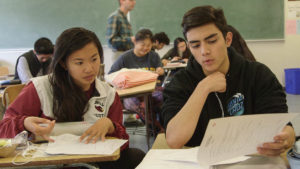
Our film follows five diverse students at a predominantly Asian American high school. Sophia is a straight-A student whose immigrant Chinese parents have taught her about the importance of getting into college from as far back as she can remember. She is co-president of the club, Girls Who Code, captain of the varsity tennis team, and editor of the school paper, and her college list consists of 12 of the most elite universities in America. UC Berkeley and UCLA are back-ups – but she’s not worried. Alvan is a brainy, hyper-social science nerd whose immigrant Taiwanese “tiger mother” charts his every move, especially which colleges he may apply to. He dreams of attending UCLA to be just out of her reach. Then there’s the 4th-generation Chinese American Ian, who is our film’s unofficial tongue-in-cheek guide to the upside-down high school universe of Lowell. Ian’s hope of going to Stanford and becoming a doctor was “destroyed” freshman year when he met the competition–in the form of friends like Alvan. But unlike Alvan, his mom calls herself an anti-Tiger Mom who discourages him from taking too many AP’s and to consider happiness over Harvard. Rachael Schmidt, a bubbly, bioengineering honor student with Harvard dreams, recently wrote the cover story to the school’s paper on being the daughter of a Jewish father and an African American mother. She is grateful that her single mother Donna pushes her, but the pressure can be daunting. Shea is one of the 15% of Lowell students who is white. He says being surrounded by demanding Asian American peers saved him from the path of pot-smoking apathy he was heading down in middle school — perhaps prompted by his father’s problems with addiction. Now he’s addicted to becoming a Nobel-prize-winning physicist – but kicks himself when his test scores aren’t in the top 1%.
To a large degree, Try Harder! is also about San Francisco’s Lowell High School. US News and World Report ranked Lowell as the second-best large urban high school in America. What makes Lowell unique?
Lowell High School is a venerable institution that needs no introduction for those in the San Francisco Bay Area. Established in 1876, it is the oldest public high school west of the Mississippi, and its name has always been synonymous with excellence in education – as a public right. In the ’60s, to curb enrollment, an entrance exam was introduced. Like many selective admissions public high schools across our nation (Stuyvesant High School in New York City may be among the most famous), it culled from the highest academic performers in the city. Over the years, Lowell alums have become Nobel-prize-winning physicists and Supreme Court Justices. California’s State Controller, aka “the CFO of CA,” Betty Yee is a Lowell alum, class of ’75.
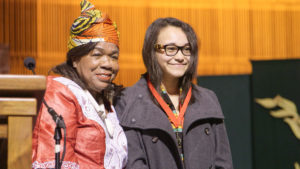
In a city grappling with the ever-widening divide between “haves and have-nots” and a problematic exodus of African Americans, the San Francisco Unified school district is a complex landscape. For AAPI families, Lowell High School traditionally represented the penultimate goal within SFUSD, and for many, it was a more important destination than college. Twenty years ago, Lowell High School was a feeder into UC Berkeley, and for generations, immigrant Asian American families brought to America a faith in public education in America. However, in the last 15 years, as competition for a spot in UC’s and private colleges has continued to increase, attitudes at Lowell have also shifted.
Knowing all this, we spent years following students at Lowell High School, where we met high-achieving students who were just like adolescents anywhere, full of hopes, fears, dreams, humor, and endless energy. But one big difference that struck me was how unifying it was for all the students of Lowell to be working toward the one goal of getting into college. Of course, they won’t all get into top colleges, but 98% will go to a four-year college. Despite all the stressors of the college application process, the students of Lowell come away with a love of learning and a “trying harder” that is deeply ingrained in their psyche.
Lowell has also been a flashpoint for issues regarding race and public education. What do you hope audiences take away from the film in terms of how we understand the complex social, cultural, and historical dynamics at play?
I aimed to take audiences on a journey through the stressful college admissions process through the lens of individual students in order to humanize a competitive application process and show how students are much more than a test score or the box for race checked on an application or one race pitted against another. I hope that audiences consider that Lowell holds up a mirror that reflects not just one high school but the complex nature of race in America. In a contested educational space, the diverse students in our film illuminate an important story of race and identity in America that goes beyond a binary black and white divide.
On a different note, what was your experience like as a high school senior? Are there specific things that the Try Harder! students experienced that you could relate to?
Like Lowell students, I always identified as a “nerd.” But in my day, it wasn’t a term to wear proudly. I went to a small college prep school in St. Louis, Missouri, and was one of a handful of Asian Americans in my school. Being Chinese American in America’s heartland at that time meant being of the slimmest minority, less than 1% of the population. It meant being outcast or invisible. My high school experience was probably most like Rachael from our film, the bi-racial African American and white student, except that my mother was not a “tiger mom.” Those were the days of laissez-faire parenting, and from that time, I understand the microaggressions that go hand in hand with being different. In making Try Harder! I was fascinated to learn about a high school universe where being Asian American is the norm. In the face of all the stress they endure, the hard-working students at Lowell High School gave me hope about the future generations.
Finally, after premiering at the 2021 Sundance Film Festival, what’s next for Try Harder! and where will audiences be able to see the film?
I’m excited to share that Try Harder! will be coming to a theater near you through a theatrical release to be announced shortly. It has already played in wonderful festivals like AFI Docs, Full Frame, CAAMFest, and won awards at San Diego Asian and DocEdge in New Zealand. It will soon be part of the Phoenix Film Festival, Bentonville Film Festival, and Sundance Asia, as well, will show in LA and NY, to name a few. Throughout the release of our film, our team has been hard at work launching our Impact campaign to re-center students at the heart of college admissions through a focus on mental health and DEI. We’re engaging in deep conversations and providing resources and panels to students, parents, counselors, and gatekeepers in the college admissions process, among other activities. We’re also really excited that we’ll be finishing up our theatrical and festival run with Indie Lens PopUp and our PBS broadcast on Independent Lens in the Spring of next year.
Is there anything else you’d like to add?
We couldn’t have made this film without California Humanities! Despite all the stress that our film shines a light on, it’s been an incredibly heartwarming experience to create such a community-minded film. Everyone on our film team feels so honored to have been welcomed by the Lowell community and had the privilege to share the Lowell story. To learn more, visit tryharderfilm.com.
Try Harder! Is supported by California Humanities through the California Documentary Project grant program.

